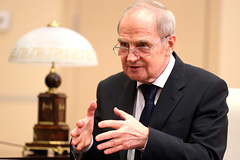Chairman of the Constitutional Court Zorkin allowed the return of the death penalty in Russia

Photo: press service of the Presidential Administration of the Russian Federation
In Russia, the death penalty may be returned in the future. This was allowed by the chairman of the Constitutional Court (CC) Valery Zorkin in his book “Constitutional Justice: Procedure and Meaning”.
He explained that the decision of the Constitutional Court, which makes it impossible to apply an exceptional measure of punishment in Russia at this historical stage of its development, does not exclude the possibility of returning the death penalty in the future.
As long as there is premeditated murder, the question of the use of the death penalty cannot be completely closed.

Valery ZorkinChairman of the Constitutional Court
“I hope that the departure from the law towards moral and religious views, which stand on the positions of a principled rejection of the death penalty, will be successful for Russia,” he summed up, expressing his personal attitude on this issue.
Demands of reprisals
The question of the return of the death penalty constantly pops up in society. After almost every high-profile crime, demands are heard to lift the ban on the murder of an attacker, while most often both citizens and some lawmakers advocate the execution of terrorists, murderers and pedophiles. In particular, on December 22, a State Duma deputy from United Russia, Sultan Khamzaev, proposed introducing the death penalty for a number of criminals. He noted that he considers this punishment adequate for previously convicted pedophiles for the repeated rape of minors. “Those who are capable of such a crime do not deserve a higher term, but a capital punishment,” the politician said.
In 2019, it became known that more than half of Russians (68 percent) believe that criminals can be executed for sexual crimes against minors and for murder (57 percent). In total, 69 percent of the respondents consider the death penalty permissible. Citizens also indicated that it is possible to execute for terrorism (53 percent), rape (52 percent), drug trafficking (26 percent), high treason and disclosure of state secrets (17 percent), bribery (14 percent), espionage (9 percent), desecration religious shrines, theft, robbery, robbery (6 percent), tax evasion (1 percent).
Lynching
In 2019, Saratov police officers were forced to use special means to protect the criminal from local residents who were going to lynch the pedophile-murderer Tuvatin. The townspeople organized a public gathering at the police department and demanded that the criminal be handed over to them, the guards had to line up like a human shield around the minibus on which he was being taken to investigative measures.
Then all the district police departments of the city were raised by alarm. Employees were ordered to urgently go to work. In August 2020, Tuvatin was sentenced to life imprisonment.
The need for execution
The last death sentence in the Russian Federation was carried out in 1996. The moratorium on the death penalty in Russia was introduced on April 16, 1997; it has been in effect since the country joined the Council of Europe. On November 19, 2009, the Constitutional Court adopted a decision according to which the death penalty in Russia can no longer be imposed and applied. The only country in Europe and the CIS, where the death penalty is applied, is Belarus.
The main argument against the return of executions is that the judicial system does not work smoothly everywhere and makes mistakes. But in the case of a sentence of an exceptional measure of punishment and the execution of the sentence, these mistakes can no longer be corrected.

